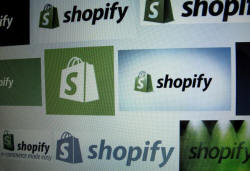Investors hope for details in Shopify's response to
short seller
 Send a link to a friend
Send a link to a friend
 [October 30, 2017]
By Alastair Sharp [October 30, 2017]
By Alastair Sharp
TORONTO (Reuters) - Retail software company
Shopify Inc <SHOP.TO> may not be willing to release as many operational
details as some investors are hoping for in response to a short seller's
criticism, a shareholder and several analysts said.
The Ottawa-based company, which provides software and back-end services
to retailers, is expected to notch further sharp sales growth of roughly
67 percent versus a year ago but still no profit when it reports
third-quarter earnings on Tuesday.
Shopify's founder and CEO Tobi Lutke has said he would use the company's
earnings call to respond to complaints from short-seller Andrew Left of
Citron Research, which included criticism of payments to bloggers and
others who get merchants to sign up to Shopify's commerce platform. Left
also called for the company to disclose the rate at which customers
leave.
A spokeswoman declined to say what Shopify plans to disclose. One
investor, who asked not to be named, said Lutke should not reveal "state
secrets" just to squash Left's criticism.

Left's report earlier this month hit Shopify's share price, but it has
recovered somewhat, and not all investors agree with his analysis.
The Shopify shareholder, who declined to be identified discussing a
holding, said the company could create a short squeeze by disclosing the
average amount its roughly 2,500 high-end Shopify Plus members pay per
month.
The minimum amount is $2,000, with additional charges due for those
processing higher sales volumes.
But "they don't need to give away state secrets just because of a
self-interested short seller," the shareholder added.
The company could also neutralize Left by, for example, telling
investors how many of its more than 500,000 customers sell goods worth
more than $100,000 a year, said Thomas Forte, a D.A. Davidson & Co
analyst who has a neutral rating on the stock.
[to top of second column] |

Canadian e-commerce
company Shopify Inc logo is shown on a computer screen in the
illustration photo in Encinitas, California May 3, 2016.
REUTERS/Mike Blake/File Photo

The company likely sees a high rate of merchants on its cheaper plans
dropping off in their first year on the platform, several analysts said.
But that number, known as churn, likely improves over time as successful
businesses stick around.
"I'd love to have churn, I just don't think we'll get it," said RBC
Capital Markets analyst Ross MacMillan, who downgraded the stock to
sector perform earlier this year on the basis of its red-hot valuation
and a more subdued view on the likely timeline for new services to boost
earnings.
Shopify's U.S. shares trading on the New York Stock Exchange <SHOP.N> had
roughly tripled in value this year, hitting a peak near $124 in September. But
they fell below $90 in the wake of Left's report and have partially recovered
since, last trading at $107.
Despite Left's attentions, the percentage of Shopify shares on loan to investors
betting its price will fall has slipped since his report, to 3.66 percent of
shares outstanding as of Oct. 12 versus 3.83 percent as of Sept. 28.
Since Left's report, the company has made several announcements that boosted its
image as a fast-growing tech darling, including plans to triple its headcount in
Waterloo in the next couple of years - adding between 300 and 500 jobs to
support Shopify Plus - and teaming up with DHL to provide international shipping
for its small business customers.

(Reporting by Alastair Sharp; Editing by David Gregorio)
[© 2017 Thomson Reuters. All rights
reserved.] Copyright 2017 Reuters. All rights reserved. This material may not be published,
broadcast, rewritten or redistributed. |